Articles and News
HOW SMYTH JEWELERS USED AN ECONOMIC DOWNTURN TO DRIVE BUSINESS WAY UP | March 06, 2013 (0 comments)
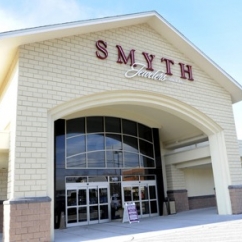
Timonium, MD--Smyth Jewelers began as a single store operation in 1914 but today has grown into much, much more. There are three Smyth Jewelry stores in Maryland; one of which is supersized (the 50,000-square foot Timonium location, left) and another of which is being renovated. The firm also has 11 Pandora boutiques across the United States, six gold buying stores called Smyth Gold Exchange, and has operational management for the recently revived Bailey, Banks & Biddle chain.
That's a lot of work and responsibility for one company, but fourth-generation Smyth Jewelers is pulling it off brilliantly. The Centurion Newsletter spoke with Mark Motes, COO, about the various holdings—and how to run a 50,000 square foot jewelry store that has 200 employees.
How it began. "Industry friends thought I was crazy," said Motes. "[When] the economy crashed, we were in a position to expand, get better leases, to grow the business." The economic downturn worked out well for the risk-taking Motes and John Jackson, who comprise the executive team at Smyth. (Two Smyth family members still work in the business: George Getschel, a sales floor manager, and Karl Getschel, a gold buying manager. Both are great-grandsons of founder Albert Smyth.)
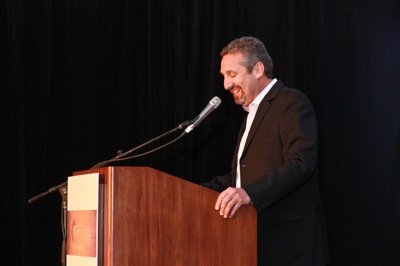
Mark Motes at the Centurion Show.
Motes and Jackson looked at the market and seized opportunities where they could grow. Then they were approached with an opportunity for an unusual partnership.
"Bailey, Banks & Biddle came to us a year ago and asked us to do some consulting," said Motes. "Their stores were not doing the volume they wanted to see. We went to our (Smyth) managers and asked them to evaluate the nine stores for a week. They came back to us with answers and an assessment." The consulting worked so well that Motes and Jackson now have taken over the CEO and COO positions, respectively, within Bailey, Banks & Biddle.
The Centurion also spoke with Motes about running Smyth's enormous main location in Timonium, MD.
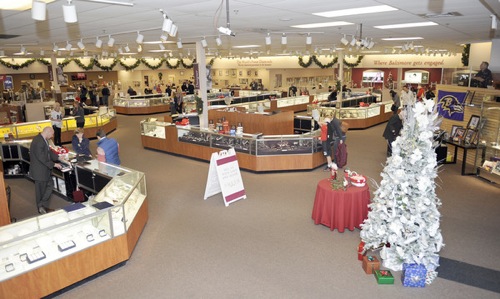
It's big: Smyth's Timonium location is 50,000 square feet total. 12,000 of that is the showroom floor.
Managers are key to success. Smyth’s Timonium location has 200 employees and sees about 600 customers a day. On an average Saturday, it’s probably 1,000 customers, says Motes.
To handle so many customers, there are three sales managers on the sales floor at all times, and four on Saturdays. "They don't have offices; they work the floor," says Motes. "They are there to greet, to have small conversations with every customer. They assess the customer's needs and match them up with the right salesperson."
Each sales manager has a team of sales associates, but the managers keep an eye on the conversation, see where an associate needs coaching and/or training after a sales presentation. "After the sale, it's not a case of the sales associate saying, "I said this," and "the customer said that," says Motes. "The managers has been listening in and keeping an eye on things. They know what goes on in the sales floor."
Most of Smyth Jewelers is run that way, with managers keeping an eye on their teams. "Our customer service department—it’s not a repair department—has 17 windows across the back of the store. There's always a line of customers there and usually two managers keeping an eye on everything. They are always listening and always nearby. They communicate with radios to the sales floor as needed."
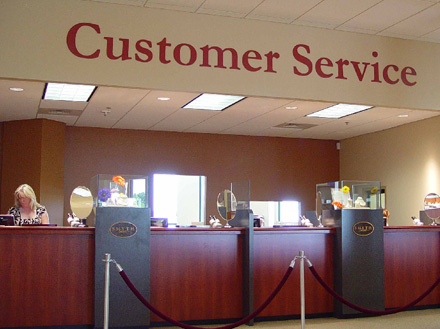
Smyth's Customer Service department has 17 windows!
The main purpose is to ensure that each customer is being taken care of effectively. "Everyone acts a little differently when your boss is right behind you," said Motes. "You try a little harder, you do a little better."
Smyth's customer service team includes three hand engravers, five shop jewelers (plus some work is done off premises), and three people that only change watch batteries and clean jewelry all day. There's also a watchmaker who works in another room to keep the dust away.
Managers meet every morning at 9 a.m., all 24 together in the boardroom, where they talk about “everything,” says Motes. That meeting is over by 9:45, and each department manager then has a daily meeting at 9:45 with his or her team.
“It's all about communication. Fifteen years ago we didn't have meetings. Everyone was going a different direction. So we found a way to make it work. On Saturday, everyone [managers plus associates] meets," says Motes.
"When a manager leaves the morning meeting, he or she has 20 things to go over with the team. It's quality control, all day every day,” says Motes.
Guaranteed thrills. From the Smyth website: “Established in 1914 by Albert Smyth, Smyth Jewelers continues to serve discriminating buyers guided by one simple principal: Deliver the highest levels of quality, value and personal service and back every produce with the legendary Smyth Guarantee. "You must be thrilled with any item purchased from Smyth, or simply return it in its original condition within 100 days of purchase and we will gladly refund your money."
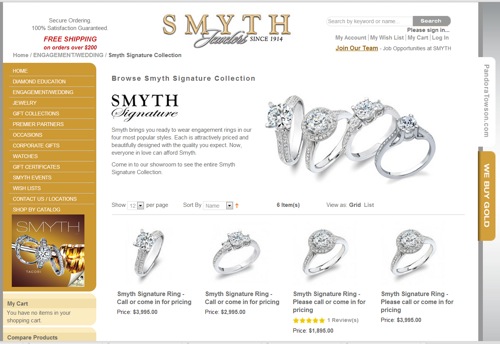
A page from Smyth's website.
Tapping the younger crowd. Smyth's customer has changed over the years; on purpose and by design. "Ten years ago, we were THE jeweler for the 40-70 year old crowd. However, we didn't want just to be where your mom or grandma shopped. We wanted to also appeal to the younger customer. The one that makes $70,000-$100,000 a year and buys jewelry. We used an agency, MGH, great for billboard, great creative ads, guerrilla marketing, all with the message that Smyth's is a fun place to shop. We wanted new customers and we didn't want to seem like we were big and intimidating. So the funny billboards and fun stuff worked."
One of the "fun stuff" is ring sizer that doubles as a beer coaster--perfect for the nervous groom-to-be:
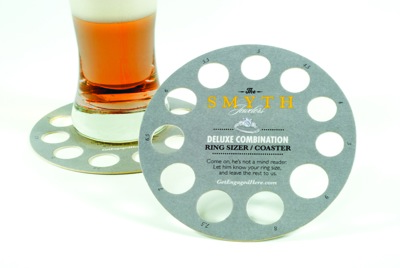
Smyth's billboards also take an irreverent tone:




Brides and sales. Bridal is a big part of Smyth's vast and varied inventory. "We carry bridal, almost every brand out there, almost exclusively made in America brands," says Motes. He feels that "bridal has targeted us; we did not target bridal. Everyone's bridal [sales] are way up, even if no one is trying. The bridal customer hasn't changed. Our average engagement ring sale is $7,000. We see some 30,000-$50,000 sales in a month. We're a big store, we need to have a big selection. We want customers to see 1,000 mountings, not just a few." Smyth offers consumer financing through GE and says the approval rate is high.
Motes admits that Smyth's inventory mix is continually changing. "We're trying to keep up with demand. We don't know what's right or wrong, just what's working for us. The public tells you what the market is, what you need to buy. If you don't keep up, you're out of business." Today Smyth carries 50% more bridal inventory than they did in 2006.
American made. For Motes, American manufacturing is the way to go. "I think that's the future," said Motes. With the economy the way it is, manufacturing prices in the U.S. seem to be coming down a bit. You can have jewelry made here for not much more that's great quality." He compares the U.S. buying cycle to an overseas one, demonstrating why buying American works.
"When you have a ring in stock, often it's not quite right and the customer isn't going to want to wait until you can reorder one from overseas with the right specs. And if you send it back, it's four more weeks and more time clearing customs. If it's American made, you can call and talk to someone because the time difference isn't too large. It's a quick fix. And even if someone makes a mistake on sizing, you can ship it overnight and have it back the next day. We're big on customer service. We want the quality to be right and the service to be right. It's easier to do that with American made."
At the end of the day, it's all about customer service, communications and American made at Smyth Jewelers, for all their holdings. "It's been a lot more work than we thought," said Motes of the various businesses. "There's a lot of work in the future; we have plans in mind that will do very well."







